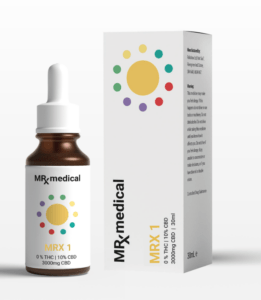Two landmark clinical trials could pave the way for a new CBD-based medicine to be made available through the NHS for the treatment of chemotherapy-induced peripheral Neuropathy (CIPN) and endometriosis.
The trials, which are being led by top researchers at the University of Edinburgh, have received combined commitments of £1.55 million in grant funding.
In Phase II randomised control trials (RCTs), the research team will study the effects of a broad-spectrum oral tincture containing CBD isolate and additional terpenes, in treating patients with the complex inflammatory pain conditions, chemotherapy-induced peripheral neuropathy (CIPN) and endometriosis.
These are thought to be the first Phase II trials to receive approval and funding since the law changed to permit the prescribing of medical cannabis in November 2018. If successful, the trials would provide a pathway for the product to be funded through the NHS for these indications.
The NHS currently spends more than £5 billion a year on the treatment of inflammatory pain conditions including fibromyalgia, neuropathy, endometriosis and rheumatology, with regulatory bodies such as the National Institute for Health and Care Excellence (NICE) and the National Institute for Health and Care Research (NIHR) specifically requesting more research on CBD and cannabis-based medicines for the treatment of pain.
A step closer to NHS access?
The product which will be used in the trials has been developed by UK pharmaceutical company MRX Medical, and will be manufactured here in the UK.
The company is said to have developed a proprietary method for formulating cannabis medicines which are essentially THC-free but contain other components of cannabis, such as terpenes, which contribute to the ‘entourage effect’.

The product which will be used in the trials. Photo: MRX/Ananda
MRX has now been acquired by Ananda Developments in an acquisition announced on Thursday 9 March.
Ananda already has a research and development licence for the production of medicinal cannabis at its cultivation facility in Lincolnshire. Announcing the news, CEO, Melissa Sturgess, says the acquisition of MRX will build on Ananda’s existing strategy, enabling it to produce novel medical cannabis oil formulations.
Ms Sturgess told Cannabis Health that she is hopeful that the trials would pave the way for NHS funding of the medicine.
“From our perspective, the best way to make medical cannabis accessible to more people is via the NHS,” she commented.
“UK regulators and prescribers have made it clear that evidence is required to unlock NHS funding and broaden support for cannabis-based medicines. We looked at the rules and what the regulators were saying and tried to work within that. NICE, in particular, has been very clear about wanting more research into CBD containing none or only trace amounts of THC.”

Melissa Sturgess, CEO of Ananda Developments
“MRX has been asked to confirm that we will be able to supply medicine commercially six months after the trial has finished, which is faster than the usual process for a trial like this. The way we’ve interpreted that is that if we’re seeing good results, they would like us to be able to make our product available commercially sooner rather than later.”
Ms Sturgess added: “I feel like we’ve passed the point of no return in that the NHS is now acknowledging that this medicine is coming, and they’re going to include it as part of the medicines that they are willing to fund.”
Addressing calls for research from regulatory bodies
Professor Marie Fallon of the University of Edinburgh and chair of palliative care at St Columba’s Hospice, will lead the clinical trial to examine whether MRX1 could be used to effectively treat CIPN in patients with neuropathic pain as a result of chemotherapy.
CIPN is a common and debilitating side effect of chemotherapy, with at least 160,000 new cases in the UK every year. There are currently no preventative treatments and few effective ways of managing symptoms, which become chronic in around 50% of patients.
The trial, which is due to get underway in May, will aim to recruit 92 patients.
Speaking at the International Congress on Clinical Trials on Cannabis, where she presented the study, Professor Fallon said: “Accumulating evidence shows that neuro-inflammation is an important mechanism underlying the development of CIPN. The potent anti-inflammatory properties associated with CBD and terpenes obviously make these ideal targets for further investigation.
“There is huge interest from patient groups about the appropriateness of CBD and from a UK point of view, NICE has specifically called for research into CBD with none or minimal THC in neuropathic pain. It is really important that we try to understand the complexities of the potential impact of CBD.
She added: “Our research addresses calls from NICE and the International Association for the Study of Pain (IASP) for cannabinoid-based research. We are going to follow the guidance set out by IASP as well as the CIPN working groups on appropriate trials and assessments. There should also be strong preclinical evidence to match a pain problem with an intervention, and we believe that is the case here.”
A potential new treatment for endometriosis
A separate RCT on the efficacy of MRX1 in the management of endometriosis associated pain is expected to start in October and will recruit 100 patients.
Endometriosis is a chronic condition affecting around 10% of women and those assigned female at birth. It occurs when tissues normally found in the lining of the uterus grow elsewhere in the body and can cause a wide range of debilitating mental and physical symptoms, one of the most prevalent being severe pelvic pain.
It is being led by Dr Lucy Whitaker, clinical lecturer in Obstetrics in Gynaecology at the MRC Center for Reproductive Health; Professor Andrew Horne, honorary consultant gynaecologist, co-director of EXPECCT Centre for Pelvic Pain and Endometriosis and a fellow of Royal Society of Edinburgh; and Professor Philippa Saunders, chair of Reproductive Steroids Centre for Inflammation Research, The University of Edinburgh.
Ms Sturgess added: “There is certainly an unmet clinical need in the treatment of these indications.
“With the main treatments for endometriosis currently being hormonal contraceptives, antidepressants or surgery, there is a glaring need for a more sensitive and efficacious treatment.”

